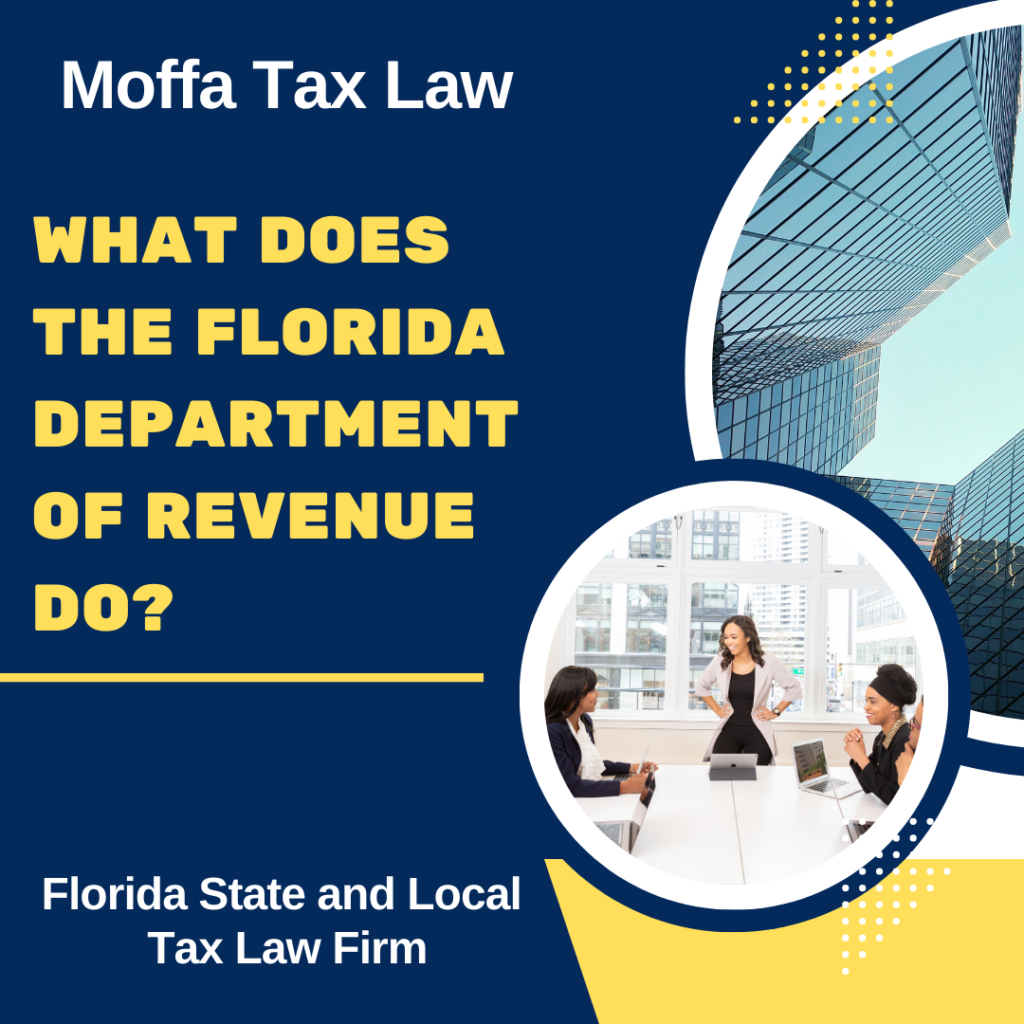NEWS & INSIGHTS


What Does the Florida Department of Revenue Do?
The Florida Department of Revenue (FDOR) plays a vital role in the administration and enforcement of state laws that impact businesses, residents, and local governments. As one of the state’s primary regulatory agencies, the FDOR oversees tax collection, child support enforcement, and property tax oversight. Its mission is to ensure that Florida’s financial systems operate smoothly, efficiently, and fairly while fostering compliance with state laws.
In this article, we’ll take a closer look at the responsibilities of the FDOR, how it serves the public, and why its work is essential to Florida’s economy and communities.
Key Functions of the Florida Department of Revenue
The FDOR has three primary areas of responsibility: Tax Administration, Child Support Services, and Property Tax Oversight. Let’s explore each of these in detail.
- Tax Administration
The FDOR is responsible for administering and enforcing Florida’s tax laws. This involves the collection of taxes that fund critical public services such as education, healthcare, infrastructure, and public safety. The FDOR’s tax-related responsibilities include:
Collecting State Taxes
The FDOR collects various types of taxes from individuals and businesses, including:
- Sales and Use Tax: Florida’s largest source of state revenue. Businesses are required to collect and remit sales tax on taxable goods and services, while use tax is owed on untaxed purchases.
- Corporate Income Tax: Levied on the earnings of corporations operating in Florida.
- Reemployment Tax: Used to fund unemployment benefits for workers.
- Fuel Taxes: Applied to gasoline and diesel sales, funding transportation projects.
- Other Taxes: Includes taxes on tobacco, alcohol, communications services, and insurance premiums.
Processing Tax Returns and Payments
The FDOR ensures that taxpayers file returns accurately and on time. The department provides resources and tools to simplify the filing process, including an online portal called Florida eServices.
Conducting Audits
The FDOR conducts audits to verify taxpayer compliance and identify discrepancies in reporting. Audits focus on ensuring businesses properly collect, report, and remit taxes owed to the state.
Enforcing Compliance
For taxpayers who fail to meet their obligations, the FDOR takes enforcement actions such as issuing penalties, levying bank accounts, or placing liens on property.
Educating Taxpayers
The FDOR provides educational materials, training, and customer support to help individuals and businesses understand their tax responsibilities.
- Child Support Services
Another critical function of the FDOR is its Child Support Program, which helps parents meet their financial obligations to their children. Florida’s program is one of the largest in the nation and serves both custodial and non-custodial parents.
Key responsibilities include:
Establishing Child Support Orders
The FDOR assists parents in obtaining court orders for child support, ensuring children receive the financial resources they need.
Locating Parents
The department works to locate non-custodial parents who are responsible for paying child support, using databases and resources to find accurate contact information.
Enforcing Support Payments
The FDOR enforces child support orders through various means, including:
- Income withholding (garnishing wages).
- Intercepting tax refunds or lottery winnings.
- Suspending driver’s licenses or professional licenses for nonpayment.
Modifying Support Orders
If a parent’s financial circumstances change, the FDOR can help modify child support orders to reflect new income levels or family situations.
- Property Tax Oversight
Property taxes are essential for funding local governments, schools, and community services. While property taxes are administered at the local level by county property appraisers and tax collectors, the FDOR provides oversight and guidance to ensure fairness and uniformity.
Key responsibilities in this area include:
Ensuring Fair Valuations
The FDOR works with county property appraisers to ensure that property values are assessed accurately and consistently across the state.
Approving Tax Rolls
Before property taxes can be levied, the FDOR reviews and approves tax rolls to confirm they meet state requirements.
Training and Certification
The FDOR provides training and certification programs for property appraisers and tax collectors, promoting professionalism and adherence to state laws.
Providing Resources for Taxpayers
The department offers resources to help property owners understand their tax assessments, exemptions, and appeal rights.
Other Services Provided by the FDOR
In addition to its primary functions, the FDOR also:
Handles Dispute Resolution
The FDOR provides procedures for resolving disputes between taxpayers and the state, including opportunities for administrative review, appeals, and mediation.
Supports Local Governments
The department distributes collected tax revenues to counties, municipalities, and other local entities, ensuring they receive the funding needed for public services.
Promotes Economic Development
By enforcing tax laws fairly and efficiently, the FDOR creates a stable environment for businesses, encouraging economic growth and investment in Florida.
Why is the FDOR Important?
The FDOR’s work impacts every Floridian in some way, whether directly or indirectly. Here’s why its role is so essential:
- Revenue Collection: The taxes collected by the FDOR fund critical programs and services that improve the quality of life for residents.
- Fairness and Compliance: The FDOR ensures that everyone contributes their fair share, reducing the burden on compliant taxpayers.
- Support for Families: The child support program helps ensure that children receive the financial support they need to thrive.
- Community Development: Property tax oversight ensures local governments have the resources needed to maintain roads, schools, parks, and public safety services.
How to Interact with the FDOR
If you need assistance with taxes, child support, or property tax issues, the FDOR offers multiple channels for support:
- Online Resources: Visit the official FDOR website for forms, guides, and frequently asked questions.
- Customer Service: Contact the FDOR by phone or email for personalized assistance.
- Local Service Centers: The FDOR operates service centers throughout Florida to provide in-person help.
- Educational Workshops: Attend FDOR-sponsored seminars or webinars to learn about tax compliance and other topics.
Conclusion
The Florida Department of Revenue plays a crucial role in ensuring the state operates smoothly and efficiently. From collecting taxes to enforcing child support orders and overseeing property tax systems, the FDOR’s work touches nearly every aspect of Florida’s economy and public services.
By promoting compliance, fairness, and transparency, the FDOR not only supports the state’s financial health but also helps businesses and families thrive. Whether you’re a taxpayer, business owner, or parent, understanding the FDOR’s responsibilities can help you navigate its processes and access the resources you need.
Additional Articles by the SALTy Orange at Moffa Tax Law:
Notice of Proposed Assessment – NOPA
Notice of Intent to Make Audit Changes DR-1215
DR-840 Notice of Intent to Audit Books and Records – 2025
What to Expect from a Florida Tax Audit
Motor Vehicle Sales Tax Rates by State – 2024

Jeanette Moffa, Esq.
Phone: (954) 800-4138
Email: JeanetteMoffa@MoffaTaxLaw.com
Jeanette Moffa is a Partner in the Fort Lauderdale office of Moffa, Sutton, & Donnini. She focuses her practice in Florida state and local tax. Jeanette provides SALT planning and consulting as part of her practice, addressing issues such as nexus and taxability, including exemptions, inclusions, and exclusions of transactions from the tax base. In addition, she handles tax controversy, working with state and local agencies in resolution of assessment and refund cases. She also litigates state and local tax and administrative law issues.


